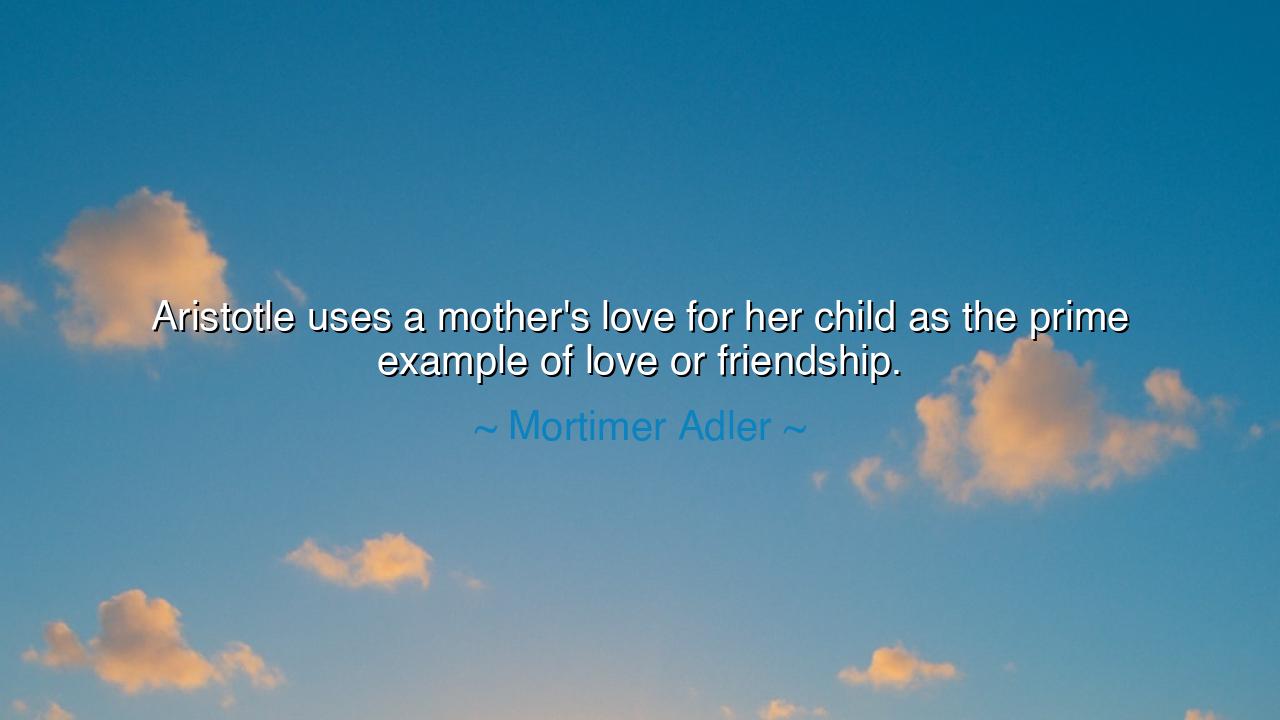
Aristotle uses a mother's love for her child as the prime example
Aristotle uses a mother's love for her child as the prime example of love or friendship.






Hearken, O seekers of wisdom, to the profound reflection of Mortimer Adler, who illuminates the teachings of the sage Aristotle: “Aristotle uses a mother's love for her child as the prime example of love or friendship.” In these words lies the recognition that the purest form of love—and by extension, true friendship—is selfless, unwavering, and rooted in the well-being of another. The bond between mother and child exemplifies a love that seeks nothing for itself, yet gives all, illuminating the highest virtues of loyalty, care, and devotion.
The origin of this insight is found in Aristotle’s exploration of human virtue and companionship in the Nicomachean Ethics. Aristotle regarded friendship not merely as a social pleasure or convenience, but as a reflection of moral goodness and mutual concern. Among the many types of bonds, he held maternal love as the most illuminating, for it embodies the selfless concern for another’s welfare, the desire for their flourishing, and the enduring constancy that defines noble affection. It is a love that is both natural and exemplary, revealing the ethical heart of friendship.
Consider the life of Queen Victoria and her children, whose devotion exemplified Aristotle’s ideal. Her care was steadfast, encompassing guidance, protection, and the nurturing of character and intellect. Her maternal love was a foundation for both familial harmony and moral instruction. In her attention to her children’s welfare, we glimpse the purest form of friendship: a bond built not on reciprocity or convenience, but on the selfless concern for the flourishing of another.
The essence of this teaching lies in recognizing that true friendship and love are intertwined with moral responsibility. The maternal bond demonstrates that the deepest connections arise when one seeks the good of another above one’s own desires. Friendship, at its highest form, mirrors this devotion: it is characterized by empathy, care, and unwavering loyalty, guiding action toward the benefit of the beloved, not the self. This is the model that Aristotle elevated—a love that is generous, enduring, and morally illuminating.
Even in history, we see echoes of this principle. The bond between Florence Nightingale and her protégés demonstrates a maternal form of devotion. Though not bound by blood, Nightingale’s care, mentorship, and unwavering concern for the welfare of those she guided exemplified a friendship rooted in ethical responsibility. In nurturing their growth and well-being, she enacted the same principles Aristotle admired in the love of a mother, extending them into the sphere of moral and social virtue.
The deeper meaning of Adler’s observation is that friendship is measured not merely by mutual enjoyment or affection, but by the selfless commitment to another’s good. Maternal love exemplifies this principle most clearly: it is constant, protective, and attentive, seeking the welfare and flourishing of another without expectation of return. In such devotion, one glimpses the highest moral ideal of human connection, where love and friendship converge in purpose and virtue.
Practical guidance flows naturally from this wisdom: cultivate friendships and relationships with care that mirrors this selflessness. Seek the well-being of those you love, act with empathy, and nurture their growth without selfish expectation. Recognize that the deepest bonds are forged not in shared convenience, but in the constant, attentive pursuit of another’s welfare, echoing the constancy and moral depth of maternal love.
Thus, remember the teaching of Mortimer Adler reflecting Aristotle: the purest example of love, and the highest model of friendship, is found in a mother’s devotion to her child. In this bond, we learn the virtues of constancy, selflessness, and ethical care. To emulate such love in our friendships is to elevate the human heart, to foster bonds of trust, loyalty, and joy, and to participate in the enduring moral fabric that sustains both individual and society.
If you wish, I can also craft a short, lyrical version for audio narration, emphasizing the emotional and moral resonance of maternal love as the model for friendship. Do you want me to do that?






AAdministratorAdministrator
Welcome, honored guests. Please leave a comment, we will respond soon